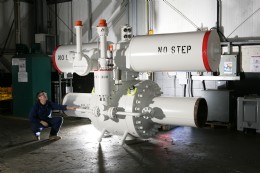Advanced Planning and Scheduling in an ‘engineer to order’ business


Enterprise Resource Planning (ERP) and Excel based planning and scheduling methods, whilst effective with ‘same’ product mix and medium scale production became challenging with the increase in volume being witnessed and the specialist bespoke nature of valve packages.
It is essential in the engineer-to-order environment that activities are coordinated so there is visibility of the entire production process, from point of order through to completion. It is also key to provide customers with realistic schedules in respect of design completions, materials, manufacturing milestones, and availability of final product.
Production within the business operates at a ‘sales order’ level per customer project, typically consisting of one to forty line items, each line having different characteristics from valve design, quantity, delivery dates and so on. And it is not uncommon in an engineer- Advanced Planning and Scheduling in an ‘engineer to order’ business to-order environment for changes to occur to these sales orders be it customer changes, manufacturing method improvements, material availability and so on. ERP and Excel based methods previously deployed made it impossible to understand the consequences of these changes within a reasonable timescale – and sometimes not at all.
It was recognised however that a software enabled planning and scheduling tool was needed to quickly rebuild a schedule to reveal those consequential changes in real time.
Advanced Planning and Scheduling, (APS) refers to a manufacturing management process by which raw materials and production capacity are optimally allocated to meet demand. APS is especially wellsuited to environments where simpler planning methods cannot adequately address complex tradeoffs between competing priorities.
In the form of a data link from the business ERP system, APS uses planned manufacturing data and material availability and applies it to a virtual data model of the manufacturing environment which mirror’s resource availability, shift patterns and resource performance factors. APS schedules the manufacturing data to give a plan that prioritises which component operations should be worked upon, in which order and on which resource to achieve the business needs. As well as providing a manufacturing plan, including individual resource loading lists, it also allows capacity review and load balancing, removing bottle-necks and utilising under loaded resources.
Traditional planning and scheduling systems such as Manufacturing Resource Planning (MRP) utilise a stepwise procedure to allocate material and production capacity. This approach is simple but can be cumbersome, and does not readily adapt to changes in demand, quantity, resource capacity or material availability. Materials and capacity are planned separately, and many systems do not consider limited material availability or capacity constraints. This approach can result in plans that cannot be executed.
As transactions are made over the 24/7 working patterns with the business ERP system, APS is updated on a daily basis to keep the software in line with current manufacturing status and new demand.
The business would typically have more than 25,000 ‘live’ manufacturing operations in, or awaiting processing at any one time. APS is able to take this volume of data and calculate a first hit schedule within minutes across circa 165 resources considering multiple constraints within the business. In addition APS has a number of optimisation rules to provide different scheduling methods depending on the area of manufacture, product type and volume of components.
Changes during order execution are common within this environment and APS offers the flexibility to quickly rebuild a schedule to review the impact of change. By quickly identifying bottlenecks, overloads and under-loads, decisions can be made to re-assign manufacture to other areas of the plant.
This flexibility and ability to adapt to changes quickly has provided the business with an increased visibility and control of its manufacturing environment even in light of the significant increases in volume which have ultimately provided their customers with an enhanced level of service.
BEL Valves Ltd
Tel: +44 (0) 191 265 9091
www.belvalves.com

| Telephone: | 0191 265 9091 |
| Email: | enquiry@belvalves.com |
| Website: | www.belvalves.com |
| More information on the BEL Valves BVAA Member Directory Page |
Search related articles: BEL ValvesIssue 23Master Class













